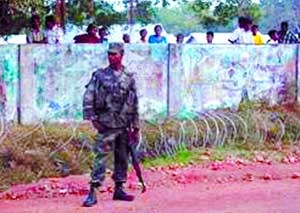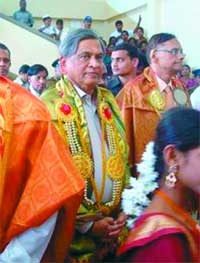LLRC promptings fall by the wayside
The sixty-four thousand dollar question doing the round in town: Is the government really under intense international pressure and will it be compelled to do something about the Tamil question, or is it all plain bluff till the Human Rights tamasha in Geneva draws to a close? I do not know how much credence to give Frances Harrison, a former BBC correspondent based in Sri Lanka, who wrote on 10 February in Pakistan’s Dawn newspaper:
 “There are signs that the international community is gearing up for action to hold Sri Lanka accountable for alleged war crimes committed by its forces at the end of the brutal civil war against the Tamil Tiger rebels in 2009. A resolution is being prepared for next month’s session of the UN Human Rights Council in Geneva. Pakistan, where the Sri Lankan president begins a three-day visit today, should not stand in the way of justice for tens of thousands of minority Tamils who perished.”
“There are signs that the international community is gearing up for action to hold Sri Lanka accountable for alleged war crimes committed by its forces at the end of the brutal civil war against the Tamil Tiger rebels in 2009. A resolution is being prepared for next month’s session of the UN Human Rights Council in Geneva. Pakistan, where the Sri Lankan president begins a three-day visit today, should not stand in the way of justice for tens of thousands of minority Tamils who perished.”
I have heard both sides make their case about the likely Geneva outcome and neither wins conclusively. My nose which cannot shake off the seven year stench of UPFA-Rajapaksa fibs and frauds says: ‘Advantage fraud!’
 I am not much impressed by this yarn about pressure from New Delhi. It’s dashed funny isn’t it, the whole Krishna episode? The Indian External Affairs Minister, with his Sri Lankan counterpart standing beside him declares with much pomp and gravitas that President Rajapaksa, who he had met only a few hours previously, had assured him, that it was his intention to “implement the 13th Amendment in full, and even go beyond it.” Nothing is done to contradict him for about four days, and then Rajapaksa tells the nation that he said nothing of the sort. If it had not been couched in diplomatic-speak, what he said was that Krishna was a bloody liar. So the ball was tossed back into India’s court, but surprise, surprise, not a squeak out of Delhi; no volleyed return, no “you’re the bloody liar” rejoinder. Delhi’s silence is deafening!
I am not much impressed by this yarn about pressure from New Delhi. It’s dashed funny isn’t it, the whole Krishna episode? The Indian External Affairs Minister, with his Sri Lankan counterpart standing beside him declares with much pomp and gravitas that President Rajapaksa, who he had met only a few hours previously, had assured him, that it was his intention to “implement the 13th Amendment in full, and even go beyond it.” Nothing is done to contradict him for about four days, and then Rajapaksa tells the nation that he said nothing of the sort. If it had not been couched in diplomatic-speak, what he said was that Krishna was a bloody liar. So the ball was tossed back into India’s court, but surprise, surprise, not a squeak out of Delhi; no volleyed return, no “you’re the bloody liar” rejoinder. Delhi’s silence is deafening!
It seems to me that it must have all been pre planned; something like this: “Machang, I will say you promised the sun, the moon and the 13th Amendment. The Indian press will enjoy three days of bliss and Sonia-Singh may line me up for a promotion. Wait a few days machang and deny the whole thing. Indians forget fast; you can wink and pacify the Wimal-Patali-JHU rabble.”
In my little dramatization the reply from our side would have been: “Hmm machang bit risky, but can do. Then you play the game in Geneva and help me out with my usual bluff.”
I am not good at this Andare type of story telling, but you know what I mean. These days a cynical imp has taken control of one lobe of my brain and whispers: ‘It’s all an act; it’s prearranged by Delhi and Colombo.’ The proof of a pudding is in the eating; two mouthfuls, if proven, will establish my point; (a) if the 13A story continues to drag on, the PSC gimmick takes over from where the moribund APRC charade ended, and Govt-TNA talks drag on in never-never land; (b) if Delhi lends support to GoSL in Geneva, and thereafter will bluff around perennially as usual. It won’t take long to prove that my cynicism is justified.
Well of course I hope I am wrong, I hope both Colombo and Delhi are deadly serious and utterly sincere about arriving at a political solution. So I will, like the more na‹ve among you, wait and see.
Will the LLRC join the APRC in the trash bin?
I think the LLRC Report is rotten backboneless cover-up in so far as accountability for atrocities against civilians by the military is concerned. It has dealt with LTTE atrocities quite frankly and bluntly and I am glad about that; but what supine bootlicking when it comes to the powers that be in the defence establishment. The tradition Sri Lankan ‘intellectuals’ adopt is the obverse of Edward Said’s “Telling truth to Power.” Nevertheless Chapter 9 of the recommendations in the LLRC Report are useful if only the government will do any of it. Three very good recommendations are demilitarization, release of detainees, and IDP issues. None of these have anything to do with devolution or long-term political solutions, nor with follow up investigation into human-rights violations by the regime and its forces (accountability issues). These the government can implement, straight away, and without TNA or PSC, or other mumbo-jumbo excuses for procrastination.
Demilitarization: The ubiquitous presence of the armed forces in the NE engenders fear and gives rise to repression, abduction and other unlawful acts. The military has even got into economic development and reconstruction. The LLRC is quite right when it says.
“The Commission, as a policy, strongly advocates and recommends to the Government that the Security Forces should disengage itself from all civil administration related activities as rapidly as possible.” – (9.134).
“It is important that the Northern Province reverts to civilian administration in matters relating to the day-to-day life of the people, and in particular with regard to matters pertaining to economic activities such as agriculture, fisheries, land etc. The military presence must progressively recede to the background to enable the people to return to normal civilian life and enjoy the benefits of peace.” – (9.227)
There is alarm in the South too about military involvement in civilian life, corporation jobs, urban development, governorships and diplomatic sinecures. Demilitarization of civilian and economic life is the common demand of people of all communities. The LLRC puts its finger on the pervasive problem of illegal detention, failure to prosecute, and detention in secret locations for torture.
Detainees
“However, the Commission expresses concern over some detainees who have been incarcerated over a long period of time without charges being preferred. The Commission stresses again that conclusive action should be taken to dispose of these cases by bringing charges or releasing them where there is no evidence of any criminal offence having being committed.” – (9.70)
“All places of detention should be those, which are formally designated as authorized places of detention and no person should be detained in any place other than such authorized places of detention. Strict legal provisions should be followed by the law enforcement authorities in taking persons into custody, such as issuing of a formal receipt of arrest and providing details of the place of detention.” – (9.67)
IDP issues:
Full reintegration of IDPs into the community and ensuring the return of the Muslims are long term issues. There is a lack of seriousness in the rehabilitation of IDPs and the provision of basic facilities for returnees is neglected while they languish in dire situations.
(For updates you can share with your friends, follow TNN on Facebook and Twitter )
